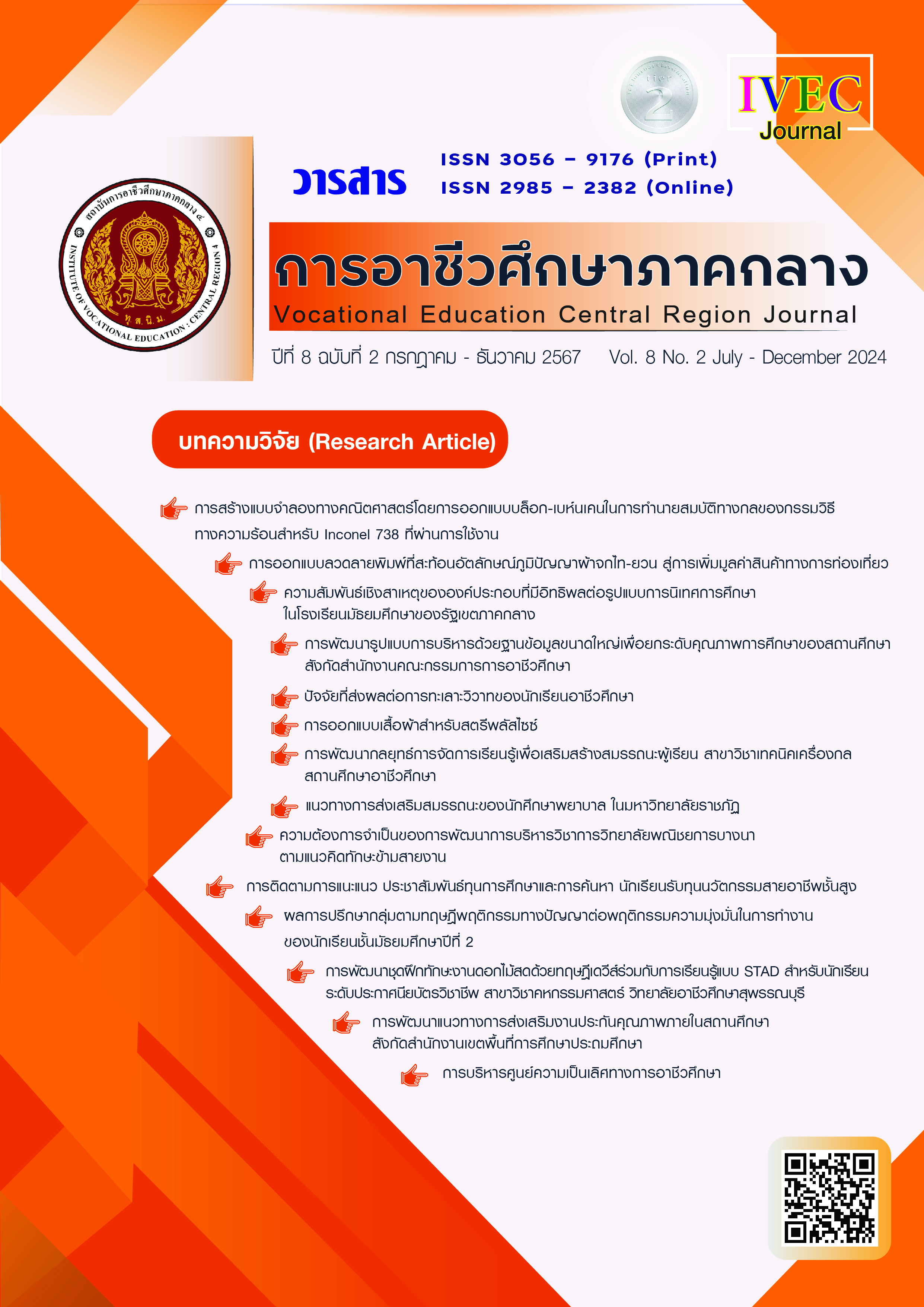Approaches to Promoting Competency of Nursing Students in Rajabhat University
Main Article Content
Abstract
This research aims to identify approaches to promoting competency of nursing students in Rajabhat University. The key informants consist of 19 experts, including nursing faculty administrators, leaders from professional organizations and educational policy management, employers of graduates, and academic faculty members involved in nursing education. The data collection tool used was an unstructured interview based on the Ethnographic Futures Research (EFR) technique.
The research finding were as follows: Approaches to promoting competency of nursing students in Rajabhat University is 9 issues: (1) Curriculum (2) Teaching management (3) Measurement and Evaluation (4) Learning Support (5) Instructors development (6) Service development (7) Research development (8) Professional development (9) Technology Utilization as follows:
1) Curriculum Development: Integrating medical knowledge, ethics, management, communication skills, theory and practice, life skills, technology use, and research to produce high - quality nurses capable of effectively responding to healthcare challenges.
2) Teaching Management: Utilizing modern teaching technologies, integrating theory and practice through internships, providing expert consultations, promoting teamwork skills, conflict management, and ethics to prepare students for professional work.
3) Assessment and Evaluation: Employing theoretical and practical tests, simulation scenarios, and online platforms to evaluate and develop students' skills, providing clear feedback for self-improvement and curriculum enhancement.
4) Learning Support: Providing training, study tours, modern technology use, digital skill development, creating learning communities, and using online resources to enhance teaching and learning effectiveness.
5) Instructors development: Focusing on training, knowledge exchange, technology use, ethical standards, and research promotion to ensure faculty members serve as good role models and provide up-to-date education that adapts to professional changes.
6) Service Development: Emphasizing practical training in healthcare settings, research, cultural skills development, numerical analysis, and statistical use to improve skills and readiness to work effectively and equitably in society.
7) Research Development: Enhancing research skills in healthcare settings, statistical use, ethics, and innovation creation to improve patient care, providing students with direct experience and increased expertise.
8) Professional Development: Preparing nursing students to care for patients from diverse cultures through training, real-world experience, and ethical education, developing skills for global healthcare service improvement.
9) Technology Utilization: Enhancing learning efficiency using computers, tablets, simulation, applications, digital platforms, and training, allowing students to gain experience and adapt to new innovations effectively.
Article Details

This work is licensed under a Creative Commons Attribution-NonCommercial-NoDerivatives 4.0 International License.
|
บทความ ข้อมูล เนื้อหา รูปภาพ ฯลฯ ที่ได้รับการตีพิมพ์ในวารสาร การอาชีวศึกษาภาคกลาง ถือเป็นลิขสิทธิ์ของวารสารการอาชีวศึกษาภาคกลางหากบุคคลหรือหน่วยงานใดต้องการนำทั้งหมดหรือส่วนใดส่วนหนึ่ง ไปเผยแพร่ต่อหรือเพื่อกระทำการใด ๆ กองบรรณาธิการไม่สงวนสิทธิ์ ในการคัดลอกบทความเพื่อการศึกษาแต่ให้อ้างอิงแหล่งที่มาให้ครบถ้วน สมบูรณ์ สงวนสิทธิ์ โดย สถาบันการอาชีวศึกษาภาคกลาง 4 ที่ตั้ง 90 ถนนเทศา ตำบลพระปฐมเจดีย์ อำเภอเมือง จังหวัดนครปฐม โทรศัพท์ 034 242 856 , โทรสาร 034 242 858 ISSN : 3056-9176 (print) ISSN : 2985-2382 (online) |
References
ขวัญตา บุญวาศ, ลำเจียก กำธร, และ จิณัฐตา ศุภศรี. (2559, กันยายน-ธันวาคม). การพัฒนาอาจารย์ในการจัดการเรียนรู้แบบสะท้อนคิดของวิทยาลัยพยาบาลและวิทยาลัยการสาธารณสุขเครือข่ายภาคใต้ สถาบันพระบรมราชชนก. Nursing Journal of The Ministry of Public Health, 26, (3), หน้า 130-143.
จามจุรี แซ่หลู่ , อรุณรัตน์ โยธินวัฒนบำรุง, นันท์ณภัส สารมาศ, จิรกานต์ พันธ์ฤทธิ์ดำ, และกนกรัตน์ จิตรา. (2565, ธันวาคม). การพัฒนากรอบสมรรถนะวิชาชีพการพยาบาลที่จำเป็นต้องพัฒนาด้วยการเรียนรู้แบบสถานการณ์จำลองเสมือนจริงของนักศึกษาพยาบาล คณะพยาบาลศาสตร์ สถาบันพระบรมราชชนก. Journal of Social Science and Buddhistic Anthropology, 7, (12), หน้า 466-485.
นิสากร กรุงไกรเพชร, สุวรรณา จันทร์ประเสริฐ, สมสมัย รัตนกรีฑากุล, ตติรัตน์ เตชะศักดิ์ศรี, ศิริยุพา สนั่นเรืองศักดิ์, ชรัญญากร วิริยะ, ตระกูลวงศ์ ฦาชา,อริสรา ฤทธิ์งาม, และ เจนจิรา เจริญการไกร. (2560, กรกฎาคม-กันยายน). สมรรถนะการส่งเสริมสุขภาพของพยาบาลวิชาชีพภาคตะวันออก. คณะพยาบาลศาสตร์ มหาวิทยาลัยบูรพา, 25, (3), หน้า 30-40.
ปรียา แก้วพิมล. (2563, มกราคม-เมษายน). ประสบการณ์นักศึกษาพยาบาลในการพยาบาลข้ามวัฒนธรรมในรายวิชาปฏิบัติการผดุงครรภ์. วิทยบริการมหาวิทยาลัยสงขลานครินทร์, 31, (1), หน้า 180-196.
ผลิดา หนุดหละ, กาญจน์สุนภัส บาลทิพย์, และ พิมพ์พนิต ภาศรี. (2565, มกราคม-เมษายน).การรับรู้เป้าหมายชีวิตของนักศึกษาพยาบาลศาสตร์ชั้นปีที่ 4, พยาบาลสงขลานครินทร์, 42, (1), หน้า 1-10.
เพ็ญจมาศ คําธนะ, นงนุช วงศ์สว่าง, กมลพร แพทย์ชีพ, และปริญญาภรณ์ ธนะบุญปวง. (2563, มกราคม-มิถุนายน). การพัฒนาหลักสูตรการคิดเชิงออกแบบเพื่อส่งเสริมสมรรถนะนวัตกรของนักศึกษาพยาบาล วิทยาลัยพยาบาลบรมราชชนนี ราชบุรี. สิรินทรปริทรรศน์, 21, (1), หน้า 103-117.
ศรัณย์พร ศรีเบ็ญจา และ สำราญ กำจัดภัย. (2560, ตุลาคม-ธันวาคม). ยุทธศาสตร์การส่งเสริมสมรรถนะของนักศึกษาพยาบาล คณะพยาบาลศาสตร์มหาวิทยาลัยเฉลิมกาญจนาเพื่อก้าวสู่ประชาคมอาเซียน. บัณฑิตศึกษา, 14, (67), หน้า 29-40.
สหัทยา รัตนจรณะ. (2566, เมษายน-มิถุนายน). มุมมองของนักศึกษาพยาบาลเกี่ยวกับการพัฒนาสมรรถนะวิจัยและทักษะแห่งศตวรรษที่ 21 ด้วยการจัดการเรียนรู้แบบโครงงานเป็นฐาน. คณะพยาบาลศาสตร์ มหาวิทยาลัยบูรพา, 31, (2), หน้า 90-100.
สำนักงานปลัดกระทรวงการอุดมศึกษาวิทยาศาสตร์ วิจัยและนวัตกรรม. (2566). แผนด้านการอุดมศึกษาเพื่อผลิตและพัฒนากำลังคนของประเทศ พ.ศ. 2564 – 2570 ฉบับปรับปรุง พ.ศ. 2566 – 2570. ค้นเมื่อ ธันวาคม 1 , 2567, จาก https://www.mhesi.go.th/index.php/news-and-announce-all/pr/announcement-news/8464-2564-2570-2566-2570.html
สุดศิริ หิรัญชุณหะ, สุกานดา บุญคง, และ ศศิธร พุมดวง. (2564, ตุลาคม-ธันวาคม). สมรรถนะการเรียนรู้ตลอดชีวิตของนักศึกษาพยาบาล ปัจจัยส่งเสริมและอุปสรรคต่อการพัฒนาสมรรถนะการเรียนรู้ตลอดชีวิต. Songklanagarind Journal of Nursing, 41, (4), หน้า 38-49.
อิสรีย์ พันธ์เหนือ, สมใจ พุทธาพิทักษ์ผล, และ สุวรรณา บุญยะลีพรรณ. (2562, มกราคม-มีนาคม). สมรรถนะด้านการวิจัยของพยาบาลวิชาชีพโรงพยาบาลชุมชน. การพยาบาลและการดูแลสุขภาพ, 37, (1), หน้า 80-87.
Anema, M. G., & Macoy, J. (2010). Competency-Based Nursing Education: Guide to Achieving Outstanding Learner Outcomes. New York: Springer.
Farokhzadian, J., Nematollahi, M., Dehghan Nayeri, N., & Faramarzpour, M. (2022). Using a model to design, implement, and evaluate a training program for improving cultural competence among undergraduate nursing students: A mixed methods study. BMC Nursing, 21, (1), pp. 49-57.
Létourneau, D., Goudreau, J., & Cara, C. (2021). Nursing students and nurses’ recommendations aiming at improving the development of the humanistic caring competency. Canadian Journal of Nursing Research, 54, (3), pp. 292–303.
Wu, X.V., Chi, Y., Selvam, U.P., Devi, M,K., Wang, W., Chan, Y.S., Wee, F.C., Zhao, S., Sehgal, V., & Ang, N.K.E. (2020). A clinical teaching blended learning program to enhance registered nursepreceptors’teaching competencies: Pretest and posttest study. Journal of Medical Internet Research, 22, (4), pp 1-13.


